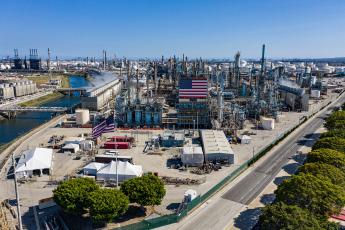In the last ten years the fracking revolution has led to amazing growth and vastly increased energy security for the United States. We’ve gone from the number-one refined product importer in the world to the number-one exporter. Workers in American refineries are fueling the country and, increasingly, the world. More than one hundred high-tech U.S. refineries support millions of jobs, spur innovation and infuse local communities with billions in tax dollars annually, driving economic security. Energy has always been a geopolitical issue and recent developments in Venezuela may endanger some of the recent advances.
Earlier this year the administration restricted imports of Venezuelan crude to cut off funding to the corrupt regime of Nicolas Maduro. This decision, made in the best interest of our nation, disrupted global crude markets and reduced the global competitiveness of U.S. refiners, many of which are optimized to process heavy Venezuelan crude. The goal made sense: to help the people of Venezuela and pressure Maduro.
With this goal in mind, the United States recognized Juan Guaidó as Venezuela’s new leader. Guaidó has installed a new board at CITGO that appointed a new CEO, and the company is now owned by friends of the United States and the people of Venezuela.
Today, there is a new concern related to CITGO assets, which were pledged as collateral for PDVSA bonds that basically funded the Maduro regime. While the United States issued sanctions restricting the transfer of Venezuelan assets, it made exceptions for holders of these PDVSA 2020 bonds, people who essentially bankrolled Maduro. If the next scheduled bond payment on October 28 is not made, it will allow these bondholders that supported the Maduro regime to exercise their rights. Allowing that to happen would not hurt Maduro, but President Guaidó and the stability of the U.S. energy industry. Why? Because CITGO represents about 4 percent of total U.S. refining capacity and is expected to play an important role in Venezuela’s rebuilding efforts following a regime change.
All told, CITGO owns and operates three refineries in the United States with total crude oil distillation capacity of about 750,000 barrels per day that produce about 17 million gallons per day of gasoline — about 4 percent of total U.S. consumption — along with diesel and jet fuel. Additionally, CITGO owns and operates 48 petroleum product storage terminals representing more than 22 million barrels of capacity and three wholly-owned pipelines that distribute crude oil and refined products. Any disruption in these operations would certainly undermine U.S. energy security.
AFPM continues to support the Trump administration’s goal of bringing stability to Venezuela. As the political situation in that country has evolved, we urge the administration to evaluate actions that would allow for the continued uninterrupted operation of CITGO refineries in the U.S. to meet the demand for gasoline, diesel, and jet fuel. For more than 100 years CITGO has employed thousands of U.S. workers, supported communities, and supplied fuels that have helped power our great country. It was likely never the intention of the administration to impact these U.S. refineries and other assets and, by extension, impact fuel supplies for consumers, hurt the economy and threaten U.S. energy security. The administration should step in and help.

